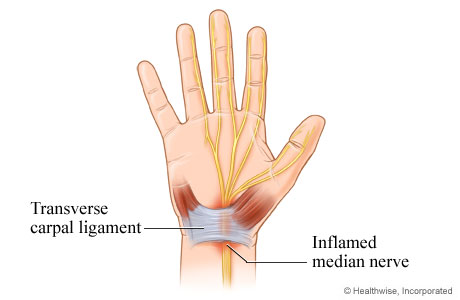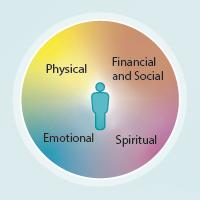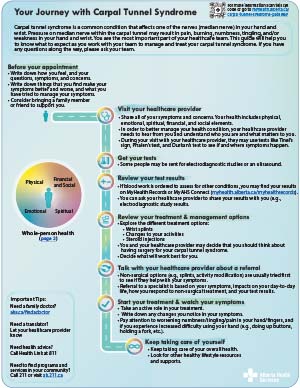This guide will help you to know what to expect as you work with your healthcare team to manage and treat your carpal tunnel syndrome.
You will have your own unique journey with carpal tunnel syndrome. How you move through your journey, the number of visits with your healthcare team, the steps you will take, and the order you take them in will depend on your needs. You will make decisions in partnership with your healthcare team. Always follow your healthcare team’s advice.
What is carpal tunnel syndrome?

Carpal tunnel syndrome is a common condition that affects one of the nerves (called the median nerve) in your hand and wrist. Pressure on this nerve can result in pain, burning, numbness, tingling, or weakness in your hand and arm. People usually feel symptoms in their thumb, index finger, middle finger, and part of the ring finger. In more severe cases of carpal tunnel syndrome, muscles at the base of the thumb (called the thenar muscles) can get weaker and smaller.
Symptoms of carpal tunnel syndrome can have a small or big impact on things that you do every day. Understanding the symptoms that you experience and their impact on your life helps your healthcare team determine whether you have mild, moderate, or severe carpal tunnel syndrome.
If you notice symptoms of carpal tunnel syndrome, talk with your healthcare provider as soon as possible so that they can support you to manage the condition. Getting help early can help reverse carpal tunnel syndrome or keep it from getting worse.
Whole-person health
The whole-person health approach will help you and your healthcare team better manage your health condition.

Whole-person health draws from the teachings of the medicine wheel. It means thinking about all parts of your health and wellness:
- physical
- financial and social
- spiritual
- emotional
These parts are all connected and impact each other. It’s important to be aware of your personal needs in each part and to share that information with your healthcare team. Your healthcare team needs to understand who you are and what matters to you.
Support and resources
- If you need a family doctor or nurse practitioner, visit Alberta Health Services:
Find a doctor.
- If you need a translator, let your healthcare provider know.
- If you need health advice any time, day or night, call Health Link at 811.
- If you need to find programs and services in your community, call or text 211 or visit
211 Alberta.
For more information about carpal tunnel syndrome, see:

Carpal Tunnel Syndrome Pathway
Download or print the
full patient pathway (PDF) and
summary (one-page PDF) to learn more about how to manage and treat Carpal tunnel syndrome.
Patient Pathway  Summary
Summary 
